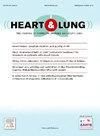Transforming Heart Failure Care: Leveraging Guideline-Directed Medical Therapy (GDMT) Discharge Order Sets to Drive Better Outcomes
IF 2.6
4区 医学
Q2 CARDIAC & CARDIOVASCULAR SYSTEMS
引用次数: 0
Abstract
Background
Heart failure (HF) is a leading cause of hospital readmissions, with approximately 20% of patients being readmitted within 30 days (Virani et al., 2021). Adherence to guideline-directed medical therapy (GDMT) has been shown to significantly improve patient outcomes and reduce readmissions, with studies demonstrating reductions in mortality and readmission rates when GDMT is optimized (Greene et al., 2018). Structured workflows, such as discharge order sets, enhance GDMT adherence and improve the continuum of HF management (Yancy et al., 2017).
Purpose
This initiative's purpose was to enhance compliance with GDMT in patients with heart failure through the integration of a CHF discharge order set within the Epic electronic health record (EHR) system. This intervention aimed to standardize the discharge process, improve GDMT adherence, and reduce 30-day HF readmission rates.
Setting/Population
This initiative was conducted at Mount Sinai Hospital, which included cardiology and non-cardiology units. The population included adult patients admitted with a primary diagnosis of heart failure, with a focus on those eligible for GDMT at discharge.
Method/Process
A multidisciplinary team comprising cardiologists, nurses, and Epic analysts reviewed existing discharge workflows and identified gaps in GDMT compliance. The team developed a CHF discharge order set designed to standardize prescribing practices for GDMT. The order set included prompts for evidence-based therapies such as beta-blockers, ACE inhibitors/ARBs, angiotensin receptor-neprilysin inhibitors (ARNIs), and mineralocorticoid receptor antagonists (MRAs).
April 2023: Initial draft of the CHF Discharge Order Set was developed and presented to the Inpatient Mount Sinai Hospital Epic Committee.
May 2023: Revisions were made based on feedback, and a second draft was submitted.
April 2023: Initial draft of the CHF Discharge Order Set was developed and presented to the Inpatient Mount Sinai Hospital Epic Committee.
May 2023: Revisions were made based on feedback, and a second draft was submitted.
June 2023: Final approval was obtained from the Mount Sinai Hospital Epic Committee.
July 2023: The order set was uploaded into the Epic Playground for testing and training.
August 2023: The order set went live system wide. Training sessions and tip sheets were disseminated to ensure staff familiarity.
Outcome Measures
Implementation of the CHF discharge order set led to measurable improvements in GDMT adherence 7 Day Follow Up Appointments, which led to reduced Heart Failure Readmission rates.
ARNI prescribing rates: Improved from 72.8% in 2022 to 81.1% in 2024.
Beta-blocker prescribing rates: Improved from 94.6% in 2022 to 95.5% in 2024.
MRA prescribing rates: Improved from 60.8% in 2022 to 77.2% in 2024.
SGLT2i prescribing rates: Improved from 62.8% in 2022 to 82.1% in 2024.
Additionally, 30-day HF readmission rates decreased from 18% in 2023 to 15.2% in 2024, underscoring the initiative's success in enhancing evidence-based care and reducing hospital burden.
Practical Implications
This initiative highlights the value of embedding guideline-directed workflows into EHR systems to enhance care delivery. The CHF discharge order set serves as a replicable model for other institutions aiming to improve GDMT adherence and reduce HF readmissions.
转变心力衰竭护理:利用指导医学治疗(GDMT)出院令集驱动更好的结果
心衰(HF)是再次入院的主要原因,约20%的患者在30天内再次入院(Virani等,2021)。坚持指南导向的药物治疗(GDMT)已被证明可显着改善患者预后并减少再入院,研究表明,优化GDMT可降低死亡率和再入院率(Greene等人,2018)。结构化的工作流程,如出院单集,可以提高GDMT的依从性,并改善心衰管理的连续性(Yancy等,2017)。该计划的目的是通过整合Epic电子健康记录(EHR)系统中的CHF出院单,提高心力衰竭患者对GDMT的依从性。该干预措施旨在规范出院流程,提高GDMT依从性,降低30天HF再入院率。环境/人口这项倡议是在西奈山医院开展的,该医院包括心脏病科和非心脏病科。研究对象包括初步诊断为心力衰竭的成年患者,重点是出院时有资格接受GDMT治疗的患者。方法/流程一个由心脏病专家、护士和Epic分析师组成的多学科团队审查了现有的出院工作流程,并确定了GDMT合规方面的差距。该团队制定了一套CHF出院令,旨在规范GDMT的处方实践。该顺序包括基于证据的治疗提示,如β受体阻滞剂、ACE抑制剂/ arb、血管紧张素受体- nepryysin抑制剂(ARNIs)和矿皮质激素受体拮抗剂(MRAs)。2023年4月:制定了CHF出院令集的初稿,并提交给西奈山医院住院史诗委员会。2023年5月:根据反馈进行修改,提交二稿。2023年4月:制定了CHF出院令集的初稿,并提交给西奈山医院住院史诗委员会。2023年5月:根据反馈进行修改,提交二稿。2023年6月:获得西奈山医院史诗委员会的最终批准。2023年7月:订单集被上传到Epic Playground进行测试和训练。2023年8月:订单集在全系统范围内运行。分发了培训课程和简报,以确保工作人员熟悉。结果测量:实施心力衰竭出院令组可显著改善GDMT依从性,7天随访预约可降低心力衰竭再入院率。ARNI处方率:从2022年的72.8%提高到2024年的81.1%。β受体阻滞剂处方率:从2022年的94.6%提高到2024年的95.5%。MRA处方率:从2022年的60.8%提高到2024年的77.2%。SGLT2i处方率:从2022年的62.8%提高到2024年的82.1%。此外,30天心衰再入院率从2023年的18%下降到2024年的15.2%,强调了该倡议在加强循证护理和减轻医院负担方面的成功。实际意义这一倡议强调了将指南导向的工作流程嵌入电子病历系统以提高医疗服务的价值。心力衰竭出院顺序集可作为其他旨在提高GDMT依从性和减少心力衰竭再入院率的机构的可复制模型。
本文章由计算机程序翻译,如有差异,请以英文原文为准。
求助全文
约1分钟内获得全文
求助全文
来源期刊

Heart & Lung
医学-呼吸系统
CiteScore
4.60
自引率
3.60%
发文量
184
审稿时长
35 days
期刊介绍:
Heart & Lung: The Journal of Cardiopulmonary and Acute Care, the official publication of The American Association of Heart Failure Nurses, presents original, peer-reviewed articles on techniques, advances, investigations, and observations related to the care of patients with acute and critical illness and patients with chronic cardiac or pulmonary disorders.
The Journal''s acute care articles focus on the care of hospitalized patients, including those in the critical and acute care settings. Because most patients who are hospitalized in acute and critical care settings have chronic conditions, we are also interested in the chronically critically ill, the care of patients with chronic cardiopulmonary disorders, their rehabilitation, and disease prevention. The Journal''s heart failure articles focus on all aspects of the care of patients with this condition. Manuscripts that are relevant to populations across the human lifespan are welcome.
 求助内容:
求助内容: 应助结果提醒方式:
应助结果提醒方式:


